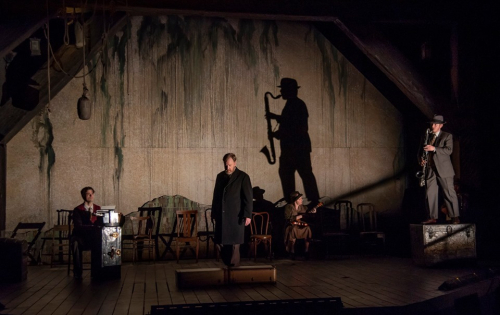Indecent
Website Review
Michelle Kenyon – Snoop’s Theatre Thoughts, June 26, 2019
A Lyrical, Boldly Theatrical “Indecent” from Max & Louie Productions
 Indecent is a play about a play. It’s a lot more than that, too, but in the new St. Louis premiere staging by Max & Louie Productions, the theatre arts are front and center. It’s a message play, certainly, with themes about censorship, artistic integrity, freedom of expression, and more. Ultimately, as currently staged at the Grandel Theatre, this new production is a triumph of lyrical staging and theatricality.
Indecent is a play about a play. It’s a lot more than that, too, but in the new St. Louis premiere staging by Max & Louie Productions, the theatre arts are front and center. It’s a message play, certainly, with themes about censorship, artistic integrity, freedom of expression, and more. Ultimately, as currently staged at the Grandel Theatre, this new production is a triumph of lyrical staging and theatricality.
Indecent covers several decades in the creation of and controversy surrounding the staging of Polish Jewish playwright Sholem Asch’s play God of Vengeance, which was originally written, in Yiddish, in 1907. Controversial in some circles from the beginning for its portrayal of characters that some Jewish critics considered stereotypical, as well as its treatment of the Torah and lesbian themes including a prominent love scene, the play still became a big hit in Europe before being brought to Broadway, translated into English, in 1923, where it became the centerpiece for a scandal. Shortly after opening, the production was raided by police and the company arrested and subsequently tried for obscenity. While God of Vengeance itself isn’t shown in great detail in Indecent beyond two prominent scenes, the point being made seems to be more about what the play represents and the issues it raised, especially concerning freedom of expression and personal, national, and religious (particularly Jewish) identity, and how different forms of prejudice (antisemitism, xenophobia, homophobia, etc.) can be bound up together. The ominous gradual build-up to the atrocities of World War II and the Holocaust, and their aftermath, is also a prominent theme. In addition to these issues, though, the play is a celebration of form, told in the manner of a traveling Yiddish acting troupe and featuring musicians as part of the production, playing Klezmer-style music among other styles such as jazz when the show’s time frame “arrives” in the 1920s. The players (TJ Lancaster, Paul Cereghino, Zoe Farmingdale, John Flack, Katie Karel, Judi Mann, and Tim Schall) all play various characters in the course of the production, and the musicians (Alyssa Avery, Kris Pineda, and Jack Theiling) are involved in the story as well. This is actually a somewhat challenging play to describe, since it covers so much in terms of scope, theme, structure, and tone. There’s broad humor and poignant drama; lyrical poetry and music and occasional theatrical melodrama. Mostly, though, it’s a highly personal story focusing on the playwright Asch (Cereghino and later, Flack) and the troupe of players led by Asch’s friend, former tailor-turned-Stage Manager Lemml (Lancaster) and the trials, tribulations, and persistent hope of expression and understanding of Asch’s most controversial work. It’s about more than one play, though–it’s about art, expression, and humanity itself.
The casting is especially strong, with a impressive, cohesive ensemble and no weak links. Although everyone plays several roles, the players–with the exception of Lancaster as Lemml–are listed in the program by age group, with Cereghino and Farmingdale as the “ingenues”, Flack and Mann as the “Elders”, and Schall and Karel as the “Middle”. Standout roles and performances include Cereghino as the first idealistic and then increasingly disillusioned and haunted younger Asch; Lancaster as the determined Lemml; Farmingdale as the younger version of Asch’s wife Madje and also as the various actresses who play the young Rifkela in God of Vengeance; Karel as the various performers playing the worldly Manke in the play-within-the-play; and Flack and Mann as the older Asches. Everyone is excellent, though, including the musicians who are almost constantly onstage, joining in with the story.
Technically, this production is nothing short of dazzling. With a masterfully detailed, versatile set by Dunsi Dai, projections by Kevin Bowman, and truly stunning lighting by Patrick Huber that emphasizes shadows and contrasts, the mood, time, and place of the show are well maintained. There are also superb costumes and wigs by Teresa Doggett and excellent sound design by Phillip Evans and music direction by Ron McGowan. The sights, sounds, and effects of this play are remarkable, bringing the audience into the experience of the play in poetic style.
This is a show that got a lot of buzz when it was on Broadway, and with this production, I can see why. Whether you know much or anything about the source material (I didn’t), it doesn’t particularly matter because you will learn a lot simply by watching this play. There’s a lot here that’s still relevant in today’s day and age, as well as an important history lesson. Overall, the effect is bold, theatrical, and fascinating. The play may be called Indecent, but this production is more than simply “decent”. It’s a remarkable theatrical experience.

